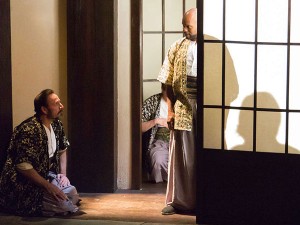
Director Charles McMahon, founding artistic director of the Lantern Theater Company, asserts that all of Shakespeare’s plays, whenever or wherever they’re set, are in fact observations about contemporary England. By shifting the locales to places outside of his homeland, the playwright made his universal themes more palatable to a British audience; in essence, they would rather hear about the human shortcomings and socio-political foibles of distant characters and cultures, than to have them exposed directly about themselves and their nation.
Following the lead of Kenneth Branagh’s movie version of As You Like It (2007) and Akira Kurosawa’s film adaptations of Macbeth (Throne of Blood, 1957) and King Lear (Ran, 1985), McMahon infuses the Lantern’s current production of THE TRAGEDY OF JULIUS CAESAR with the aesthetics of feudal Japan, a society that faced some of the same issues as those presented in the infamous history of the ancient Roman emperor: the pitting of personal ambition against politics; and the rights of the leader versus the rights of the people. According to McMahon, similar concerns were also found among the Elizabethan aristocracy, who wanted to preserve rather than to relinquish their privileges to a powerful monarch. Interesting ideas, but do they work in a play about real figures and an actual event that we all know occurred in the Curia of Pompey in 44 BC? Shakespeare himself seems to have promoted the concept, in the words he wrote for Cassius (Act III, Scene 1): “How many ages hence/Shall this our lofty scene be acted over/In states unborn and accents yet unknown!”

If you accept the conceit, and can reconcile the historical facts of the script with the artistic license of the design, you will surely appreciate Lantern’s stunning production. Scenic designer Meghan Jones sets the stage with Shoji screens in place of classical columns, Brian Strachan costumes the cast in traditional warrior attire and robes instead of togas, and the Kyo Daiko Ensemble pounds its Taiko drums to the beat of Christopher Colucci’s original Japanese-inspired music. And McMahon’s accomplished actors demonstrate their fluidity with Shakespeare’s language and their recognition of its gravity, with especially passionate performances by Joe Guzmán as Cassius, Adam Altman as Marullus, U.R. as Brutus, Jered McLenigan as Marc Antony, and Forrest McClendon as Caesar.
Along with its stage production, the Lantern will host a three-part series of Scholars In Conversation, “Friends, Romans, Countrymen: Julius Caesar in the Modern World.” The educational discussions will consider the timeless themes contained in the play, and how the past can provide a perspective on the important issues of today. February 6-March 16, 2014, lanterntheater.org.
Extras:
- Deb Miller’s review of JULIUS CAESAR at Central Voice
- Kathryn Osenlund’s review at CurtainUp
- Christopher Munden’s Phindie review
- Video of actor Forrest McClendon discussing his title role.

One Reply to “On the Universality of Shakespeare: Roman History through a Shoji Screen in the Lantern’s THE TRAGEDY OF JULIUS CAESAR”